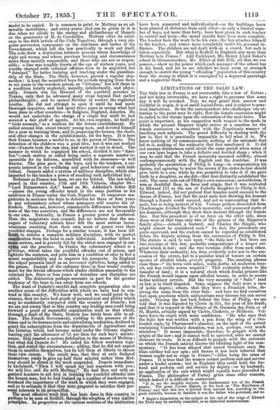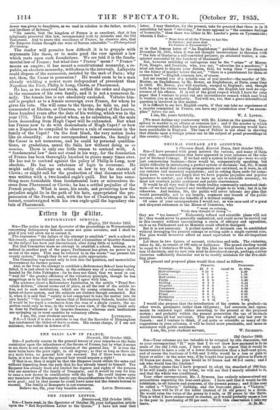LIMITATIONS OF THE SALIC LAW.
THE Salie law in France is not irrevocable like a law of Nature ; and not being irrevocable, we have a right to presume that some day it will be revoked. Nay, we may grant that, narrow and doubtful in origin, it is of small logical force, and is subject to prac- tical limitations. So far the correspondent who challenges our at- tention to the point may be right, that the female succession might be called to the throne upon the exhaustion of the male heirs. The point is important, as his suggestion with respect to the mode in which the present Emperor might arrive at a sanction for the female succession is consistent with the Napoleonic manner of handling such subjects. The grand difficulty in dealing with the law is, that it is practically impossible to tell what it is. We know nothing of its commencement, nothing of the rationale that led to it, nothing of the authority that first sanctioned it. It did not assume distinctness until about the same period when many of our own laws began to take a definite and decided shape ; when it may be said that the French monarchy assumed solidity, almost
contemporaneously with the English and the Austrian. It was
probably the speculation of Philip le Long—in compromising his claims, and agreeing to waive the crown if his sister-in-law should give birth to a son, while he was permitted to take it if she gave birth to a daughter, as she did—that first distinctly established the rule. The same rule cut off Philip's own succession ; nevertheless, it was so doubtful then, in force and origin, that it was contested by Edward III as the son of Isabella daughter to Philip le Bel. Edward, indeed, did not pretend that females could succeed to the throne of France, but that the next male heir drawing his descent through a female could succeed, and not as representing that fe- male, but as being nearest of kin. Various princes descended from Charlemagne divided the French monarchy, and possessed parts of his domains, although they drew their descent through the female
i line. But this precedent s of no force on the other side, since there were at that time only two of the princes of the Emperor's family alive,—Arnold, a bastard ; and Charles the Simple, who might almost be considered such.* In fact, the precedents are quite equivocal, and the custom cannot be regarded as established before the dispute arising from the succession of Philip le Bel. The statute is said to rest upon "the Salle law " ; but there are two versions of this Jaw, probably compendiums of a longer ori- ginal which is lost; and the two versions differ from each other. Whatever their authority, too, they evidently refer not to the suc- cession of the crown, but to a peculiar kind of tenure on certain. species of allodial lands, private property. The enacting phrase runs thus—" De terra vero aalied, nulls portio ad mulierem tran- sit, sed hoe virilis seams acquirit." This evidently refers to the transfer of land ; it is a natural check which feudal princes like the French would impose upon allodial tenure, in order to secure better military service. But the very meaning of " Salle " land or law is in itself disputed. Some suppose the Sabi were a race of noble degree ; others, that they were a Frankish tribe, de- riving the name from the river Sala : and here we find ourselves lost upon questions which antiquarians may discuss but can never settle. Tracing the law back behind the time of Philip, we are told that it was digested by Clovis in 511, the year of his death; and that it is reposed in the library of St. Germain des Pres, or of St. Martin, actually signed by Clovis, Clodovio, or Hildovio. Vol- taire fixes its origin with more confidence. "He who says that the Salle law was written with a pen from the wing of a two- headed eagle by Pharamond's almoner, on the back of the patent
containing eagle, donation, was not, perhaps, very much mistaken.' It seems impossible, therefore, to grapple with the origin of the law; and it cannot well be uprooted, since we cannot discover its roots. It is as difficult to grapple with the rationale on which the French satirist throws the blinding light of his com- mentary. "It has been alleged that sacred Scripture says, the lilies neither toil nor spin ; and thence it has been inferred that women ought not to reign in France,"—lilies being the arms of France. It is true that the women cannot perform suit and service under a feudal system ; but in England they could hold the fee- hood and perform suit and service by deputy—or by husband; an application of the rule which might equally have prevailed in France. The philosopher of Ferney gives some other reasons, which indeed it is difficult to controvert. "It is say the doughty lawyers, the fundamental law of the French empire, The great Jerome Bignon, in his book on The Excellence of France' says that this law is derived from natural law, according to the great Aristotle, because in families it was the father who governed, and no
• Ravin's dissertation on the subject at the end of the reign of Edward the Third may be usefully consulted, as an historical memorandum.
dower was given to daughters, as- we read in relation to the father, mother, and brothers of Rebecca."
"He asserts, that the kingdom of France is so excellent, that it has religiously preserved this law, recommended both by Aristotle and the Old Testament. And to prove this excellence of France, he observes also, that the Emperor Julian thought the wine of Surene admirable."—Philosophical Dictionary. The reader will perceive how difficult it is to grapple with arguments like these, or to• make good the case against a law which rests upon such foundations.- We are told it is the funda- mental law of France; but what does " France " mean ? " France " means an empire ; it has meant a constitutional monarchy, a re- public, an absolute monarchy, with chaos in theintervals. Lafayette could dispose of the succession, assisted by the mob of Paris ; why not, then, the Ciesar in possession P He would -seem to be a man already wielding a power more independent of precedent than Napoleon the First, Philip le Long, Clovis; or Pharamond. He has, as we observed last wee1s! settled the order and degrees in the succession of his own family, and it is not a numerous fa- mily. The female line is-not absolutely excluded. Voltaire him- self is prophet as to a female sovereign over France, for whom he gives his vote. She will-come to the throne,. he tells us, and be consecrated at Rheims, or Chartres, or in-the chapel of the Louvre, three hundred years after the date of his-writing, which was in the year 1771. This is the period when, as-he calculates,. all the male heirs descending. from Hugh Capet will be exhausted. But what has France now to do with deseendants of Hugh Capet? or how can a Napoleon be compelled to observe a rule of succession in the family of the Capet ? On the first blush, the very notion looks like an absurdity. As our correspondent remarks, the family of the User is not numerous,, and he could by personal qualifica, tions, or gradations, annul the Selig law without doing so eo nomine. There is only one little reason to contend with. A "fundamental law " does not stand in his way, for the foundation of France has been thoroughly knocked to pieces many times over. He has not to contend against the policy of Philip le Long, now obsolete. He has no substance of logic to overcome. He might safely challenge an action at. law to try the statute of Clovis ; or might call for the production of that document which was written with a two-headed eagle's quill. But he has some- thing more formidable than fundamental laws or miraculous de- crees from Pharamond or Clovis; ha-has a- settledprejudice of the French people. What is more, his uncle, not perceiving, how the prejudice might lie in the path of- his heir, appropriated the. pre- possession of the French, and, with the bee of Charlemagne in his bonnet, countersigned with his own eagle-quill the legendary sta- tute of Pharamond.



























 Previous page
Previous page